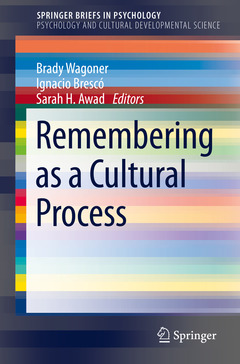Remembering as a Cultural Process , 1st ed. 2019 SpringerBriefs in Psychology and Cultural Developmental Science Series
Auteurs : Wagoner Brady, Brescó Ignacio, Awad Sarah H.

- The microgenesis of memories in conversation
- The role of narrative mediation in the recall of history
- Remembering through social positions in conflicts
- Urban memory during revolutions
- How memorials are used to channel grief and collective memory
Brady Wagoner
Brady Wagoner is Professor of Psychology and Director of the MA and PhD programs in Cultural Psychology at Aalborg University. He received his PhD from the University of Cambridge, where he also co-created the F.C. Bartlett Internet Archive. He is associate editor of the journals Culture & Psychology and Peace & Conflict. His research focuses on the cultural and constructive dimensions of the mind, particularly in relation to memory, imagination and social change. His most recent books include The Constructive Mind: Bartlett’s Psychology in Reconstruction (Cambridge University Press, 2017), Street Art of Resistance with Sarah H. Awad (Palgrave, 2017), Handbook of Culture and Memory (Oxford University Press, 2018) and The Psychology of Radical Social Change with Fathali Moghaddam and Jaan Valsiner (Cambridge University Press, 2018). He has received two early career awards from the American Psychological Association (divisions 24 and 26) and has won research fellowships at Institutes for Advanced Studies in Lyon and Madrid.
Ignacio Brescó de Luna
Ignacio Brescó de Luna is an Associate Professor at the Department of Communication and Psychology, Aalborg University, Denmark. He is a member of the research Centre for Cultural Psychology, co-founded by the Danish National Research Foundation and AAU under the Niels Bohr Professorships Scheme. He is also a member of the Culture of Grief center, funded by the Obel Foundation. He received a Ph.D. at the Autonomous University of Madrid, where he worked as assistant professor until 2014. His research topics revolve around collective memory, national identity, the teaching of history, and the narrative mediation of remembering. He has co-edited a special issue on collective memory in Culture & Psychology (2017), on memory and conflict in Peace & Conflict (2016) and on cultu
Provides an overview of a new theoretical framework that is contextualized within the history of ideas
Provides a variety of methodological approaches for studying remembering as part of a cultural process
Offers case studies taken from countries around the world (e.g., England, Spain, Egypt and U.S.A.)
Date de parution : 12-2019
Ouvrage de 108 p.
15.5x23.5 cm



